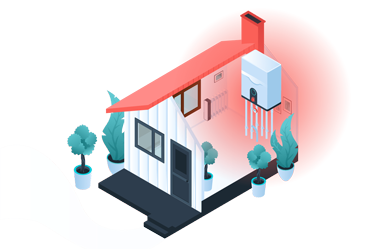What Is A Conventional Boiler? (Comparison with Combi Boilers)
Confused about conventional boilers? Whether you want to learn how they function, compare them against other types of gas boilers, or find out their pros and cons — you’ve come to the right place. In this post, we will discuss all these things and help you make an informed decision before you buy or replace one.
Here’s all you need to know about the UK’s traditional heating and hot water system.
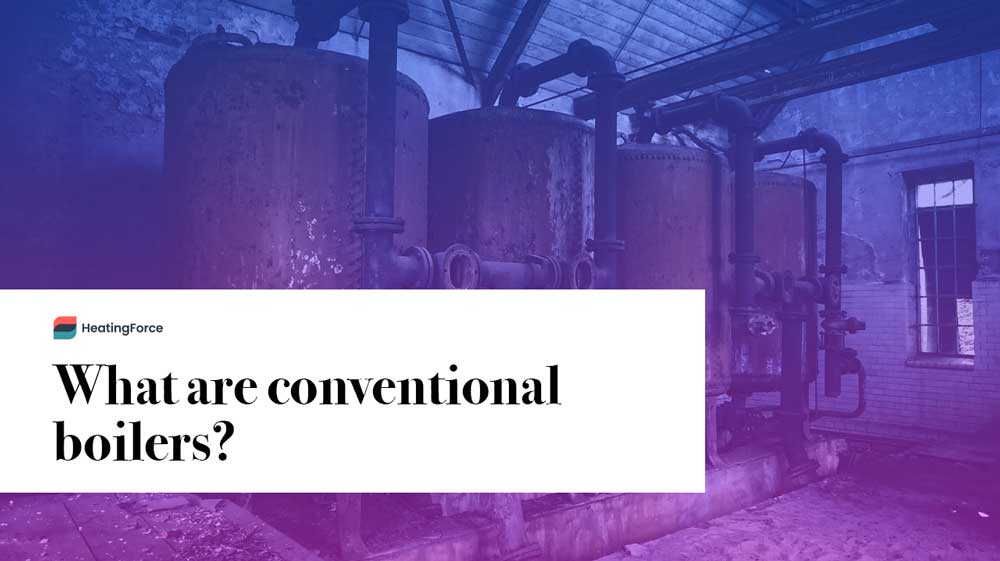
What Is a Conventional Boiler?
Also known as heat-only boilers, regular boilers, and open-vent boilers, they are the once-favoured heaters that are still so symbolic of older homes. They serve hot water to both the wet central heating system and the home’s taps, and normally need 2 cold -water storage tanks, plus a hot water cylinder to run. Their tangled means of heat distribution and their size is what sets them apart from the more compact combi (combination) boilers and makes them less desirable.
Although their fame is dwindling, heat-only boilers are still available on the market and make a great choice for many.
How Does a Conventional Boiler Work?
A conventional, or regular boiler comprises several key components, all of which are needed to supply a home with heat and hot water. These are:
- a cold-water storage tank
- a feed and expansion tank
- a hot water storage cylinder
- a heat exchanger
Here’s how all these moving parts work to heat your home:
- Water from the mains travels up to the home’s loft, and feed both the cold-water storage and the feed and expansion tanks.
- The cold water tank supplies its contents to the home’s cold taps.
- The feed and expansion tank sends water to the heat exchanger, which heats the water.
- The circulator pump then pushes hot water into the hot water cylinder, where it’s ready for use throughout the day.
- When you switch the thermostat on, hot water starts to travel the home’s grid of pipes and radiators.
- When you turn on a hot water tap, hot water likewise comes from the hot water tank.
- Having passed through the radiators, return water cycles back into the heat exchanger for reheating.
- If too much hot water ends up in the cylinder, the excess flows up to the feed and expansion tank (hence the name), or a dedicated expansion vessel.
Sealed vs Open Vented Systems
Most newer boilers come with an expansion vessel to deal with surges of water supply in the home’s piping network. These are called “sealed systems,” and their boilers are dubbed “system boilers”. Where the excess water is sent to a feed and expansion tank, the system is referred to as “open-vented”.
These days, open-vented systems are suffering a decline in demand. That’s because storing water in an open tank leaves it bared to dust and other pollutants, which then end up flowing out of the home’s taps.
These systems also call for more frequent cleaning to avoid debris build-up in the pipes.
A sealed system, on the other hand, allows for better water quality, takes up less space, and needs less upkeep.
Whether the system is sealed or open-vented, its capacity to hold surplus water prevents the home’s pipes, pumps, and radiators from bursting.
What Is a Combi Boiler?
Now that we’ve seen how a conventional boiler works, let’s take a peek at its newer, combi counterpart. After all, it’s their simpler means of operation and a smaller size that make them so much more attractive.
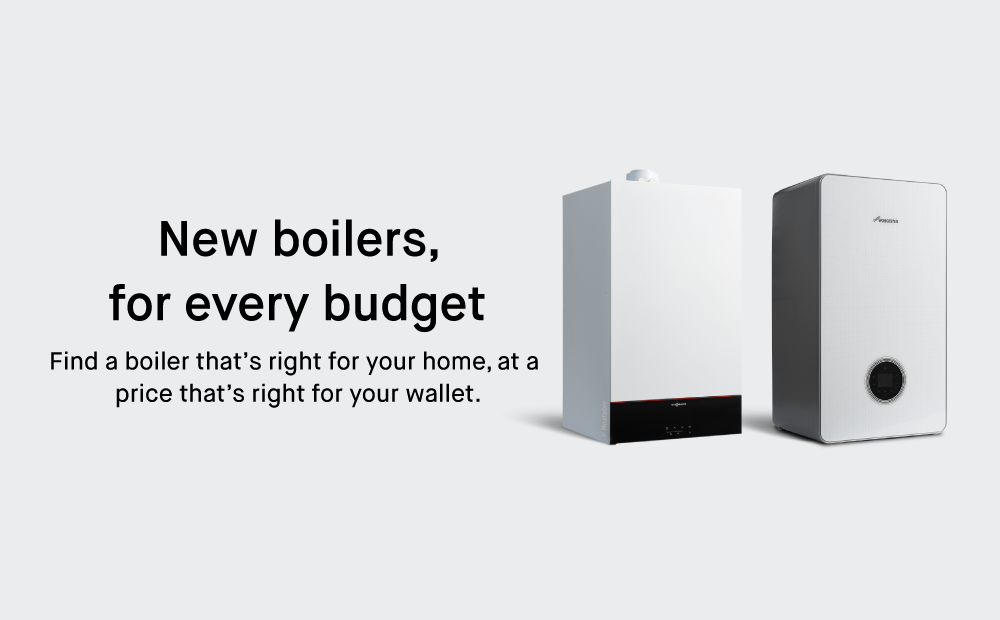
Like regular boilers, their combi variants supply heat and water to the building they serve. Their key distinction lies in a joint mechanism that links water and space heating.
Unlike conventional boilers, combi units do not require water storage tanks; their heat exchanger warms up the water that circulates the central heating system. Combis also supply tap water on demand – the boiler’s secondary heat exchanger heats it straight out of the mains.
Because they heat water only when you need it, combi boilers score higher than regular ones on energy efficiency. Thanks to their compact size, they’re suited for smaller homes and take less effort to maintain.
On the downside, a combi boiler’s supply capacity is rather limited; so if you’re in the shower and someone flushes the toilet, you’ll know about it.
That said, if the mains pressure is high enough and not all taps are on, combi boilers can still serve water at a fair pressure.
Which Is Best, Combi or Conventional Boiler?
If you’re buying a new boiler, it’s natural to study all of your available options. Now that you know how conventional boilers and their combi peers operate, let’s compare the two and give you a better idea of which one is the right fit for your home.
- Does your family have many members?
- Do you live in a large house?
If you said yes to both, a conventional boiler may be the better heating option for you.
Why? Because larger families tend to consume more water.
Also, they tend to use more water at the same time.
Conventional boilers are splendidly fit to provide generous loads of water at once. Those giant storage tanks up in the loft hold enough water to let your family cook, shower and wash clothes without fretting about water pressures falling to a drip.
That said, conventional boilers are massive. Which is why we asked the second, fairly urgent question: is your house large? Those very tanks that keep the water pressure high also take up tonnes of room up in your loft (so you better have a loft). The hot water cylinder, likewise, needs a home — typically, you’d keep it in an airing cupboard.
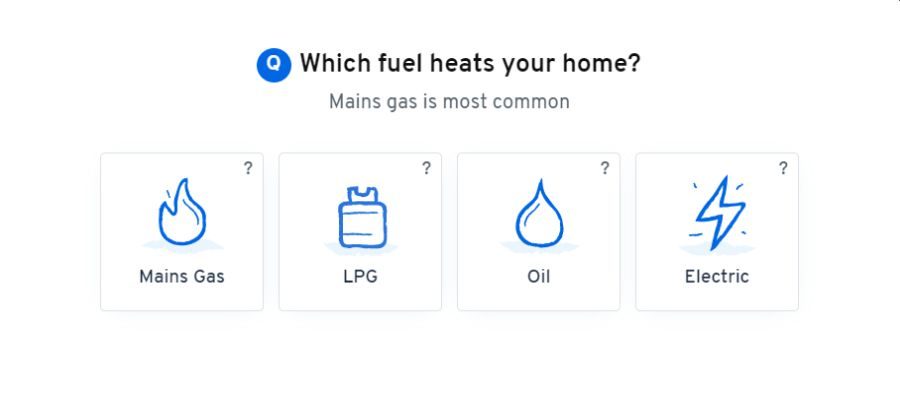
If your family has a consistent thirst for water, and your house is large, a heat-only boiler may be the right choice for you.
Even with a smaller home, you might make it work if you go with a systems boiler instead of a heat-only unit.
And remember: systems boilers use a comparatively small expansion vessel for excess water and don’t need a second storage tank.
Combi boilers, on the other hand, are great if you prioritise efficiency and operating costs. Because they heat water on demand, combis waste less energy keeping water hot, and you have a chance of reducing your energy bills. They’re a grand choice if you don’t use too much water at once and if your home is smaller than average.
Conversely, larger homes may need combi boilers with higher flow rates to face the increased demand for water volume and pressure.
Should I Replace My Conventional Boiler With a Combi?
If you have a conventional boiler, chances are it’s been there for ages and a replacement couldn’t hurt. That said, you need to evaluate carefully your water and heating needs and research other available heating systems before you choose a replacement.
When to Choose a Heat-Only Boiler
As we’ve pointed out before, large, busy households with myriad appliances guzzling water all day need concurrent access to lots of water to get sufficient tap pressure. If this sounds like your home, then those water storage tanks you already have are serving a vital purpose — they keep your water pressure high enough that you can carry on with your daily tasks.
In this case, a new conventional boiler system may be a better fit than a combi. Of course, you can use this chance to upgrade it to a systems boiler and free up some space in your loft while keeping the hot water storage tank.
When a Combi Boiler Is the Better Choice
Conversely, if you’re a family of 2 or 3, and your water use is moderate, then lower pressures may not be of concern. In your case, the conventional boiler is wasting too much power, and you’d be better off getting heat and hot water on demand. A combi boiler sounds like the better boiler type! The swap would help cut your heating bill and free up some space in your home.
How Much Does It Cost to Replace a Regular Boiler With a Combi?
Ah, that’s a tougher question. As you already know, the infrastructure differs sharply between regular and combi boilers. So, if you’re removing a heat-only boiler, you’ll have to do away with all your legacy piping, water tanks, cylinder, and the boiler itself. Along with them, expect some drywall to come down too. All these additional tasks inflate the total cost of boiler replacement.
Then, Gas Safe heating engineers will install a new network of pipes, and the new combi boiler, and attach it to the mains. That’s if you want the new device in the same place; if you don’t… well, you can see where we’re going with this.
And that’s not all; there are still these often-ignored little details:
- new heating controls;
- disposal of the existing boiler;
- making good demolished finishes inside the home;
All said and done, you’re looking at a few days of disruptive work and a total new boiler cost that’s likely north of £3,000.
You can start by getting fixed-price boiler quotes for your regular-to-combi conversion from Heatable. They’re an online boiler installation company that offer excellent deals on Worcester Bosch Greenstar and Viessmann Vitodens combis.
Then, you can compare your Heatable quotes with boiler prices from your local heating companies.
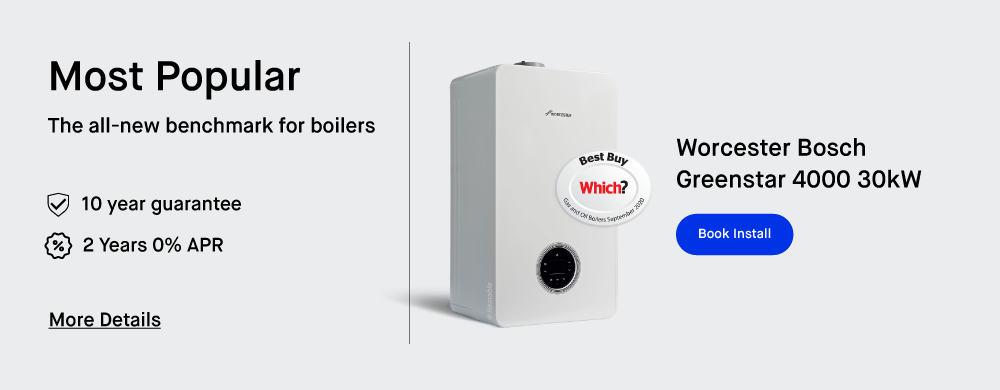
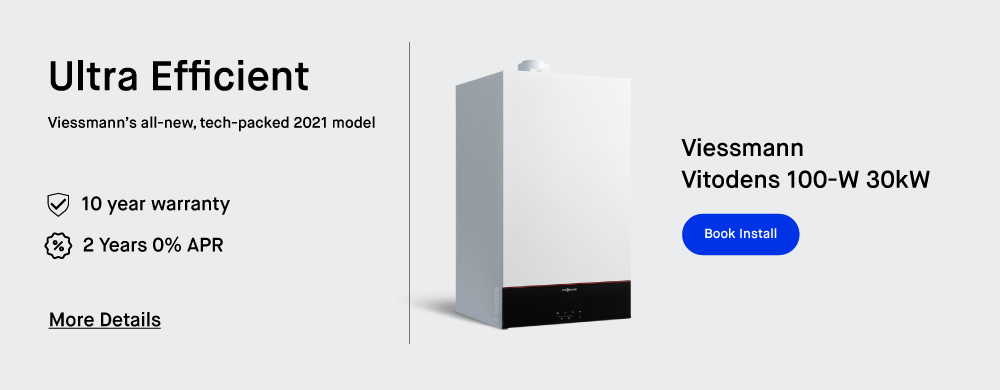
While the costs may seem steep, and the work too involved, the swap may still be advantageous if you just don’t need a regular or systems boiler; for instance, if you live alone or in a tiny household.
Can You Still Buy Conventional Boilers?
Absolutely, these machines are not yet obsolete. Many older homes are still have water tanks, and lots of folks still buy these units for the reasons we’ve discussed above.
If you’re looking to buy a new regular OR systems boiler, check out Heatable’s guide by clicking here. You’ll see that prices are similar for the 2 brands they carry, Vitodens and Ideal Logic. What drives the price is the system’s power output: the more kW it can produce, the more you’ll pay, and that’s the story with all boilers.
If you’re considering a new conventional boiler to replace an old unit or to equip a brand-new home, don’t be put off thinking they’re dinosaur technology.
Modern conventional boilers are state-of-the-art units that comply with current codes, and they’ll serve you well if you live in a large home with high water demand.
So, if you feel a regular boiler is the optimal heating method for your home – go ahead and get one! And remember, you can still save some loft space by choosing a system boiler, which otherwise works just the same.
What are the Pros of a Conventional Boiler?
Whether you have a regular boiler in need of replacement, or you’re aiming to purchase a brand-new one, we will help you weigh the pros and cons of these machines. Let’s start with the pros.
- Conventional boilers come with water storage. OK, are you’re wondering what’s great about all that water sitting in your home? Here goes. If the power goes out, you will have a supply of hot water handy for some time – hopefully enough to get you through the power cut. Likewise, if your boiler breaks down and you need hot water, you can solve the problem with a simple back-up immersion heater until your boiler is working again.
- Conventional boilers can heat a vast amount of water. If you’re used to dripping taps when the entire family is going about their daily routines, then a regular heater may be the right solution. With as much available hot water as these machines produce, your taps should never lose their pressure.
- Replacing conventional boilers with their combi peers is arduous and pricey. OK, so that’s more a con for combi boilers, but you see what we mean – if you have a regular boiler installed in your home, it’s much simpler to swap it for a new regular boiler than for a combi system.
- Conventional boilers work well with solar water heating. Unlike combi boilers, which lack a hot water cylinder and don’t accept heated water, the bulk of regular boiler systems are compatible with solar thermal panels. This means free-ish hot water in the summer months and the resultant energy savings.
What are the Cons of a Conventional Boiler?
Now, we’ve hyped up regular boilers quite a bit in this post, and you may rightly start to wonder why most people want a combi. Here are some less-than-appealing facts about these ancient apparatuses:
- Conventional boilers are less efficient. Think about it – they heat water whether or not you will use it. If it doesn’t end up flowing during the day, it’ll sit in the tank overnight until it cools off. Then, the boiler must fire up anew to heat the water once again. Combi boilers, on the other hand, heat water on demand, when you turn on a tap or shower. Over time, this efficiency can lead to substantial savings.
- Conventional boilers take up lots of space. Two water tanks up in the loft; a cylinder in the airing cupboard; the heat exchanger, the pump, the pipes – it’s a lot of hardware compared to combi boilers. Some smaller homes may simply not have enough space to fit these gargantuan machines.
- Conventional boilers cost more to install. Again, this is due to the extent of the infrastructure. Combi boilers take up way less space, and their installation process is a bit less intrusive.
The Bottom Line
The traditional way of heating the UK’s homes may lack the popularity of the new combination boiler systems but still offers distinct advantages in some cases.
Large homes with busy families and high water needs benefit the most from regular boilers, as these heat and store vast quantities of water. Their users will still find hot water in their taps for some time if their boilers fail, or the power goes out. Likewise, those who consider installing solar panels may benefit from a compatible boiler system to augment their hot water and heating needs.
Those with smaller homes and less water use, however, would doubtless be better off with a combi. Check out the best combi models here.
Is there anything we’ve missed? If we have, or you’ve got a question, please leave us a comment below and we’ll respond as soon as possible.
